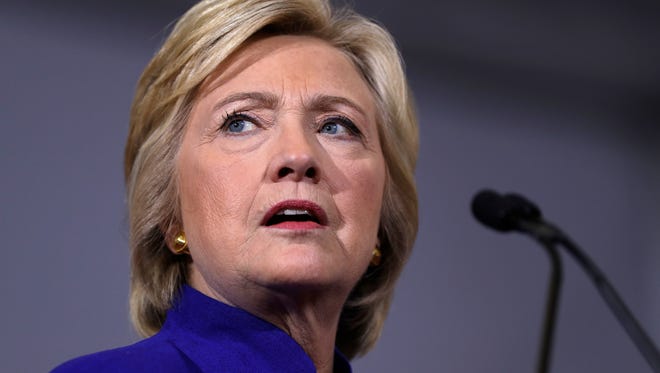Coffee killed 1 of 13 Clinton devices, emails show
WASHINGTON -- Nearly 200 additional pages released late Friday from the FBI's now-closed investigation of Hillary Clinton's use of a private email server show an often-haphazard handling of sensitive information and devices by top aides who scrambled to keep their boss in the loop on important digital information.

One aide recalled helping Clinton replace BlackBerry devices three or four times during her tenure, once after the secretary spilled coffee on a device and again when one of the new devices began to "slowly fail over time.''
Each time, confidential assistant Monica Hanley told FBI agents in a January interview, that a new device was secured and a technical aide would "sync'' it with Clinton's server and then "talk Hanley through the process of wiping the old device.''
"Hanley would provide the new BlackBerry to Clinton along with the old/wiped BlackBerry,'' the FBI reported. "However, Hanley was not sure what Clinton did with the old BlackBerry after Hanley turned them over.''
An initial release of investigation documents earlier this month showed that Clinton used 13 BlackBerry devices as secretary of State. All of those devices, the report said, could not be located for analysis.
In July, FBI Director James Comey recommended that no criminal charges be brought against Clinton, though he described the handling of classified information by Clinton and others as "extremely careless.''
The documents released Friday largely included summaries of interviews with former top aides to the now Democratic presidential nominee who outlined their activities on the former secretary's behalf, including the shuttling of secure documents to Clinton's homes in New York and Washington.
One unidentified aide, who was responsible for channeling a range of information to Clinton, from benign ceremonial notifications to "top secret intelligence briefings,'' was "unaware'' that Clinton was working off a personal server. When the aide did receive emails from Clinton, the aide thought it "a little odd'' that that were marked as having come from "H,'' because State Department emails usually contained the senders full names.
Another unidentified aide who worked in the State Department's Office of Information Programs and Services (IPS) told FBI agents that although Clinton took office in January 2009, the IPS office was unable to locate any emails between the time of her swearing in through April of the same year.
"At some point, the determination (by State's Office of Legal Counsel) was made that the emails would not be considered official State records,'' the official told agents.
The IPS official described a rush last year to vet 296 emails, culled from a review of 30,000, that were found to relate to a congressional review of the 2012 attack of the U.S., diplomatic compound in Benghazi, Libya. The official said she did not believe that the attorneys assigned to prepare the congressional response had the "appropriate training.'' Later the official told agents that she believed "there was interference with the formal (Freedom of Information Act) review process.''
State Department spokesman John Kirby disputed the claims late Friday, saying that the matter was reviewed by State's inspector general who "found no wrongdoing.''
"We have been clear all along that our Freedom of Information Act review of former Secretary Clinton’s emails was a complex and multi-step process which included consultations with State Department policy experts and legal advisors, as well as other government agencies,'' Kirby said.
Meanwhile, Jacob Sullivan, a top Clinton aide at State, told agents that he, too, was unaware of Clinton’s use of a private email server.
Though Sullivan said that he sometimes used a personal gmail account. On one occasion, while attending a bachelor party in Idaho, Sullivan recalled receiving an email to his private gmail account from State Department watch officer regarding a “pending military activities of a foreign military.’’
Questioned about the sensitivity of the email, Sullivan told agents that the officer “must have had reason to believe it could be sent on an unclassified system.’’
“Sullivan stated everyone he worked with at (State) worked hard while under pressure and used the best judgment they could to accomplish the mission,’’ according to a summary of the FBI’s interview.

Asked about another email referring to a drone strike that had transited on an unclassified system, Sullivan told agents that the sender may have believed the strike had already been reported by news outlets.
In an extended interview with one of Clinton’s closest aides, Huma Abedin, agents pressed on her knowledge of Clinton’s communications with President Obama.
Abedin said that the president received emails only from approved addresses and that each time Clinton changed her primary email address, the White House had to be notified so that her communications would not be rejected.
Presented with a June 28, 2012, email chain, Abedin said she did not recognize the name of the sender--a pseudonym used by the president. '"How is this not classified?'' Abedin told agents.
"Abedin then expressed her amazement at the president's use of a pseudonym and asked if she could have a copy of the email,'' the FBI summary stated.